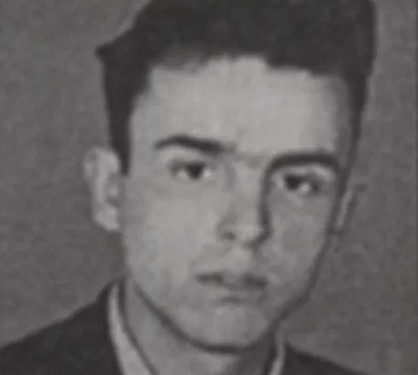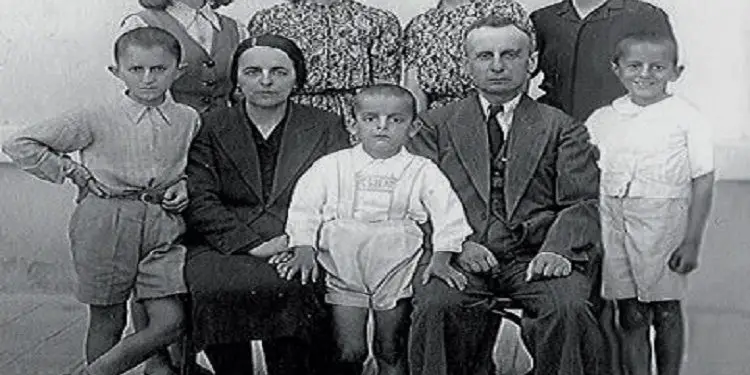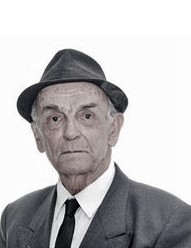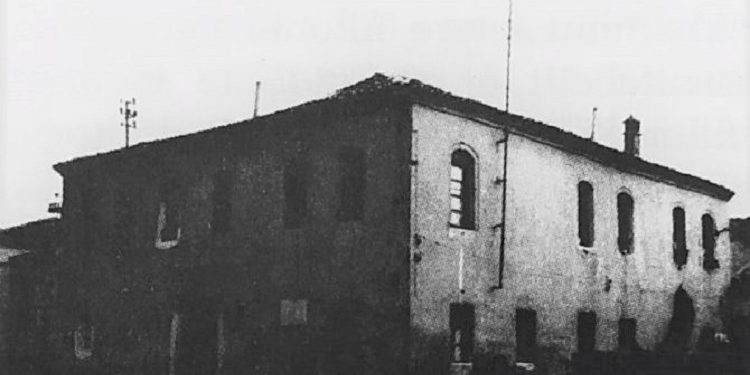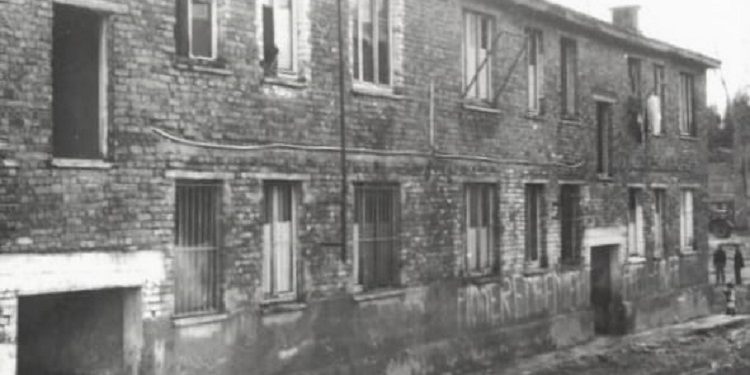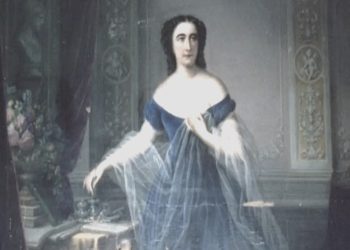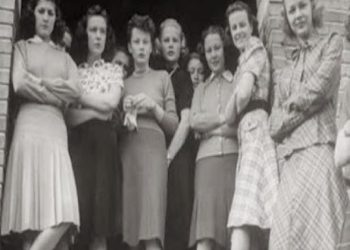By Reshat Kripa
Part sixteen
Memorie.al / “Sometimes, when a child is faced with severe trials from the tenderest age in the secret recesses of his soul, a kind of scale is born, a delicate scale, with which he weighs the affairs of this world . Feeling innocent, he submitted to his fate without making a sound. I didn’t cry at all. He who has no reason to be scolded, does not scold others”!
(Viktor Hugo, “The Man Who Laughs”)
SHORTED YOUTH
Dedicated to family and society,
Author
Continues from last issue
LOVE IS REBORN
In September, I started classes in the second grade. As usual I was an excellent student. One evening, a journalist from the “Voice of Youth” came. He asked to do an interview with a good student. The chemistry teacher recommended Elin. She was a good student, but not at my level. At this time, Fejzi Xherahu, one of our classmates says: – “Teacher, we have an excellent student, Reshat Kripa. Why didn’t you send it”?!
This question awakened a pride in myself, but at the same time, it put me in a difficult position. I knew I couldn’t give interviews in newspapers. Even Fejziu knew such a thing, but he did it anyway. The teacher sat without speaking. He did not expect such a question. Then he said: “I’m sorry, I didn’t do it on purpose.” Or not Reshat”? He wanted my support. I held tight. I had to give an answer. I told him briefly: – “For me, it doesn’t matter”.
That’s how this matter was closed. One evening, my friend, Maliq Agaj, who was continuing the first grade, comes to class. He was accompanied by a girl about seventeen years old. They approached me and said: – “Ida is the daughter of my brother, Agos. He will continue the lessons in your class.” I understood that he brought it to me, to take care of it. Moreover, to accompany him at home. He lived in the neighborhood “Lirim”, no more than a hundred meters from our house. – “Don’t worry. Let him sit in my bank, because I have no one.” What caught my eye about this girl was her perfect body. I sat down on the bench and we started talking. At this time the math teacher came in and we were silent.
We were returning home after school. On the side of the road where we were walking, a channel had been opened for water pipes. I walked by the canal. She was on my right. He tried two or three times to get out from the left, but he couldn’t. The channel did not allow it. Back then, the mentality was that only the wife or a family member could stand on the right. I listened to her movements, but deliberately did not make way for her. So we arrived at the gate of her house. We shook hands. Before we parted, I told him:
– “If you need anything, come to my house. We can learn together and solve the tasks”. – “Thank you! Good night”. – “Good night”! Ida was the daughter of Ago Agaj, a well-known personality of the province of Mesaplik. He had finished his higher studies in Vienna for agricultural engineering. Known patriot, active participant in the War of Vlora in 1920 and other patriotic activities. In September 1943, he was appointed Minister of Agrarian Economy in the government led by Rexhep Mitrovica. He had previously been a prefect in Mitrovica. There he worked with dedication for the Kosovo issue. For this, the locals called him; “Kosovar from Vlora”.
At the end of the war, like many other patriots, he was forced to take the path of exile in Italy, Egypt and finally in the United States of America. In Albania, he left his wife with five daughters. When I met Ida, the first four were married. Ida was small. He lived together with his mother, who worked as a worker in the cement factory.
That’s how I met him. The days passed one after the other. Every day we became closer. Another feeling was invading our hearts. It was not the feeling of friendship. It was something else that made our hearts flutter. A new love was making the heart wake up again. Interesting, but I couldn’t live without love! School days gave me special pleasure. Especially when we were coming home. We stood for minutes in front of her gate, talking. This kind of thing caught the eye of the neighbors, who did not hesitate to throw us some trash. But we pretended not to hear them.
One Sunday we decided to have a dance evening with the class. The organizers were me, Ymer Dogani and Alfred Çobani. We booked the orchestra, prepared a small buffet and also invited some teachers, mostly younger ones. We decided to do it, in the hall on the first floor of the school. All students of the class participated. The orchestra began to play the pieces. It started with the melody of the well-known Italian song “Marina”, which was very popular at that time. Ymer addressed me: – “It’s up to you to open it.”
That was the custom at the time. The evenings were opened by the organizers. I left. I decided to dance with Eli but, without even realizing it, my feet pierced Ida. She got up, blushing a little, leaned on my arms and we started rolling. Dancing with him, I felt like I was flying in heaven. The evening continued for several hours. It was a wonderful evening. I danced with Ida several times. When we were done as usual, I walked her home. At her gate, the same rhythm took place. Endless conversations.
The next day, together with Ymer and Alfred, the director of the day school called us to the office. Janaq Sykua. – “Last night you held a dance party at school,” he said, turning to me, “who did you get permission from”?! We had actually notified the director of the night school, Pirro Arapi, but we didn’t tell him anything. We didn’t want to mess that up either. Ymer motioned for me not to speak. He knew my position. For himself and for Alfred, they knew he couldn’t do anything to them. They were from communist families. Ymer intervened and spoke:
– “We thought it was not necessary”. – “You were the organizer”? – he addressed me again. – “No, it was me and Ymeri”, – answered Alfred immediately. The director was upset. He realized that he could not do anything. – “This is the first and last time you organize such evenings without permission”! We left. When we got outside I shook hands with my friends, thanking them. That year we organized several such evenings, but not in the school bar.
May 24, 1961. The tenth anniversary of my arrest. We were in my room. There was no one at home. Father and mother had gone for a visit. Fatushja was at school. We were with Ida, doing the lessons. But the mind was not there. She flew where her heart ached. In an instant I grabbed her hands and started caressing her. She blushed but did not speak. He didn’t pull his hands either.
– “Ida, I love you”! – I told. She couldn’t speak, but what her mouth couldn’t say, her shining eyes said. – “Do you agree to be my wife”? – I continued! – “Yes,” he answered slowly. – “I love you too”. I pulled her closer to me and we shared the first love kiss of my life. It was a magical moment…! After so many years spent in hell, I was enjoying the sweetness of a kiss. Its taste remained on my lips for the rest of my life.
It was the second love of my life. The first one was for Neri. Which one was more powerful?! I do not know. Both were clean. Both sincere and powerful. I have loved both with all the power of my soul. What is the difference between them then? The first was a very beautiful childhood dream, which remained so until the end. And the second was the reality that made it possible to create a family. It was as the song sung at that time by the Italian singer Gabriella Ferri said:
“Com’è bello il primo amore.”
Il secondo è piu bell’ ancore”!
The next day I wrote to Vjollca, about everything. I was only twenty-five years old. I had spent a third of my life.
“How beautiful the first love
But the second most beautiful yet”!
OUTCOME
Today I am in old age…! At this age, I remember my life. I remember the sayings of Arizhofka, in my early childhood. Strangely, although I am not a believer in such things, it seems to me that they have passed, just as she predicted. My manhood, like that of many others of my class, went through ups and downs.
Moments of joy, but also of deep sadness, which in any case would make me lose the meaning of life. I don’t want to write about these. I want them to remain inside me. I want to forget them. They belong only to me and no one else. However, I want to write about some special moments of my life and the fate of other characters of this writing.
My love with Ida continued for three consecutive years. I had an objection from my parents. This is because the two older brothers and sister were still unmarried. I asked for the help of Dr. Isufi, who came to my side this time as well. She had known her father. Talked to my that. On October 4, 1964, our marriage took place, after three and a half years of love.
My first great joy was the birth of my son, Artan, on April 19, 1966. But that didn’t last long. The day he turned forty days old, while his mother was preparing to celebrate, he suffered a cerebral hemorrhage, which would take his life on June 10 of that year. We hadn’t experienced death in our family in years and it hit us where it hurt the most. The father became very attached to the son. He was his idol. No one dared to speak to him or scold him.
On November 18, 1971, the first daughter, Rudina, was born, while on November 6, 1978, the second daughter, Ersela. Meanwhile, my father had closed his eyes on March 10, 1973. We remained like all the families of our strata. Ida worked as a worker in the greenhouse enterprise, while I, as a mason and for some time, with the insistence of my friends, like Veli Premtaj and friends, as a brigadier of the construction brigade, in the investment sector of that enterprise.
I cannot forget some difficult moments when I saw the treatment of my children. These caused me pain, more than for myself. When Artan turned fifteen, I remembered femininity. A feeling of dread, of a repeat of my past in him, sent shivers down my body. Artan finished high school. After a year, they took him as a soldier in the genius ward, in Shilore of Shijak. It was December. I went to see him after a few days. Those were very difficult times. Albania was going downhill. The economic situation was extremely difficult. The toll system prevailed, for all food items. One kilogram of meat per month, per family. So are other food items.
That month he met that the ration was goat meat, covered with fat. What should we do?! We had nowhere else to go. We baked it, added a few other things and off I went. I will never forget that day. As I was leaving, I once again turned my head from the ward. His silos were the same as those of the camps where I had spent five years of my life. I felt a great pain, even much greater than when I was inside myself. That month in the family, we did not eat meat. Today, Artan has found his way. He graduated from the Faculty of Law and Economics. He lives together with his wife, Dorina, doctor of sciences in economics, and his beautiful daughters, Nikola and Noel.
The year 1990, the year when communism took over. Rudina was in her last year of high school. Drafting time. The theme was free. Rudina developed a topic that, if it had been a few years ago, she and I would have both ended up in prison. He imagined himself in the United States of America and from there, he sent me a letter, where he described life there, but not in black colors, as it had been described until then.
The design reflected the real America, the one that Albanians had dreamed of for a long time. This caused a stir in the school. They called me too and tried to complicate the matter more. But the wolf’s teeth had now fallen out and he could no longer bite. Rudina’s dream came true. In 1999, she won the right to reside in the United States by lottery. There she finished college for finance, with excellent results, being declared an honor student. She worked as a specialist entering statistics into the computer. in a taxi company. After a year, he decided to work voluntarily. at the New York airport, helping elderly people get safely from the plane to their cars or vice versa.
After graduating from college, she got a job at a paper materials company, where she entered data into the computer and after a year, with her devoted and fruitful work, she rose to responsibility working as a credit account specialist. Today she lives happily with her husband, Rafael Serano, and two sons like birds of paradise; Raphael and Gabriel, in the city of Philadelphia.
Year 1988. Ersela had finished primary school. The result was excellent. All decimal grades. He especially liked ballet. He was a leader in the school group. With the help of a stranger, we were able to win the right to compete at the ballet school in Tirana. I went with him. Competed brilliantly, but it was all for naught. All were set in time. It was determined who should be at the top and who should be at the bottom of the “elite”. However, Ersela was not broken. She continued her path of success.
Always on top. Today he is in the United States of America, where he defended his master’s degree in architecture at Columbia University in New York. Even there it continues to stay at the top. The final goal he has set for himself is the defense of his doctorate. I have the conviction that she will achieve this. A number of medals won prove this. What her father could not do, her daughter is doing.
And the other characters of this book, how did the story go during these years?
Fatushja stayed in the family until Besnik was released. Then in 1964, she married Xhevdet, the grandson of the Elder of Vlora, Ismail Bey Qemalit. As a result of the marriage, two children were born, a daughter, Ada, and a son, Luli. Fatushja continued her teaching profession in various schools in Tirana, until 1978, when she retired. Despite the difficult economic situation, she was able to educate her children. Ada graduated from the Faculty of Economics, while Luli graduated from the Faculty of Mechanical Engineering.
In her old age, she had the support of her children, who spared her nothing. He closed his eyes on January 16, 2007. Today Ada. lives in Bologna, Italy, while Luli continues in Tirana. Dawn finished high school the year I was arrested. They did not give him the right to study. Could finish one surveyor’s course and wandered for years, the fields that were reclaimed and the canals that were opened. Finally, he settled in Tirana, where he also completed the faculty of construction engineering.
He married Zakije Hoxha from Gjirokastra, with whom he had two children, Anila and Bendis. Today he lives peacefully, surrounded by love from girls. Besnik’s life was the most difficult of all family members. Almost twelve years in prison, in the wild camps of Nizhavec, Gosa e Vogël, Ura Vajgurore, Vlashuk, Shtyllasi, Rinas, Zadrima, Thumana, Cerma, Bubullima, as well as the prisons of Tirana and Vlora. I will never forget that day in December 1961 when he was released from prison. I had gone out to meet him together with Qamila and Fatusha, in the prison of Vlora. When we saw it, it seemed as if we had a shadow before our eyes…! He was extremely weak and sick. He could barely stand. We took a taxi and went home. Mother and father were eagerly waiting for us there. There were moments that the pen cannot describe.
The only work that awaited him was the tunnels of the brick factory, so that when he came out of there, no one knew who he was. Continued and successfully completed evening high school. He continued in that job for 30 years, until he retired. The two children, Myneverja, who took the name of her grandmother, who had closed her eyes only three months ago, and Ariani, live in Italy. Besnik and Kresnikja were happy with their children. Every year they came for vacations to their parents’ town, while they went to Italy from time to time to spend time with their children, grandchildren and granddaughter. On November 26, 2006, at the age of 73, he closed his eyes.
When Myrtezai was released from prison, his family settled in Peshkopi. His father had been able to secure work as a hotel manager. Being far away from the place where he had carried out the “hostile” activity, Myrteza had the opportunity to finish secondary and higher Pedagogical school. For years he wandered around the villages of Dibra, teaching students. His beautiful voice made him become a member of the Peshkopia pop group. His favorite song continued to be; “Oh my mountain spice”. Today he lives with his wife in Durrës. His son is in the United States of America, while his daughter is in Tirana.
Doctor Isufi, after his release from prison, was appointed in Vlora. He was the best otorhinologist in all of Southern Albania. In a special way, he served ex-prisoners, with whom he had once shared a bite to eat. But his care was also for all other citizens, becoming one of the most respected people in the city. He married Mrs. Gjyltere Pipa, a chemical engineer, and God blessed him with a son, Einar, who is now in Italy, where he works as a doctor. The Doctor closed his eyes in 1988, without enjoying the day of freedom for which he had dreamed and sacrificed so much.
Veli’s life for a long time continued like that of all people of our class. With much effort, he was able to finish the economic faculty. He worked for a while in the villages of Vlora, until we joined again, in the “Vlora” Agricultural Enterprise, me as a foreman and him as a construction technician. Fate did not work for him. When freedom was just beginning to bloom, when he was waiting to take his rightful place, he passed away suddenly on April 25, 1991, at the age of fifty-six. Today the wife and sons live in Tirana, while the daughter is in the United States of America.
Vjollca and Kristaq stayed in Thumana for several years, where the little Kujtimi completed primary school. Then they settled in Mamurras. Kujtimi finished high school there, but the doors of high school for him. Were closed, although he was an excellent student, just like his mother, a few years ago. I continued regular correspondence with them, I even went to see them several times, when I was going to Laç, to my sister’s.
Sadiku was released from prison in 1962. But the consequences of his suffering made him close his eyes after three years. Two years later, his wife also closed them. Vjollca was left alone with her husband and son. In July 1990, Kujtimi, along with others, entered the German embassy. Today it is located in Germany. He graduated from the University of Munich and obtained the title of Doctor of Political Sciences. It also attracted his parents, who already live there, along with their son’s children.
As for Neri, she remained loyal to Vlora. She lives there with her husband and children. During this period of fifty years I have met him only twice. The first time was in 1979, when I had a problem to solve and she genuinely helped me, and the second time was in 1992, when she came and asked me for help with something, which I immediately asked for. Both of these meetings were friendly, meetings between two old childhood friends. A prominent man has said: “Friendship in love can be returned, but love in friendship, never”! However, in our case, love had turned into friendship. The old dream was already forgotten. Each of us had our own life.
These were the main events in the life of the characters of this book. My wife and I continue to live peacefully in our family in Tirana. Opposite the apartment, we have that of our beloved son, who has not been separated from us for a single minute. We have a great longing for the girls who are far away, but we also talk to them often on the phone and, when we hear their voices, it seems as if we are close to them. However, from time to time, they come and meet us. Now I am seventy-three years old. It seems to me that the third prophecy was also fulfilled, which Arizhofka had told her mother, one of the days, after I had escaped from drowning:
– “The boy will live a peaceful old age.”
I only regret one thing. For my shattered youth, which passed covered, by the shadow of old age.
Some time ago, I met my friend Ylli Bora. Once upon a time, there was a young man full of energy and humor. He wanted to write, but his works, like many others, did not find their way to publication. When I met him, he seemed very old. His hands were shaking from Parkinson’s. The legs could barely support the weight of the body and he walked more slowly. We sat down to drink a coffee. We started talking about the troubles of our lives. For hostages and our dreams. He told me that with those trembling hands, he had published five books and had the sixth in his hands. The will to write was still alive.
Finally, when we parted, he told me a golden expression that I will never forget, until these years that I have left passed: WE SURVIVED, BUT WE DIDN’T LIVE?! Memorie.al
Tirana, on December 19, 2008




